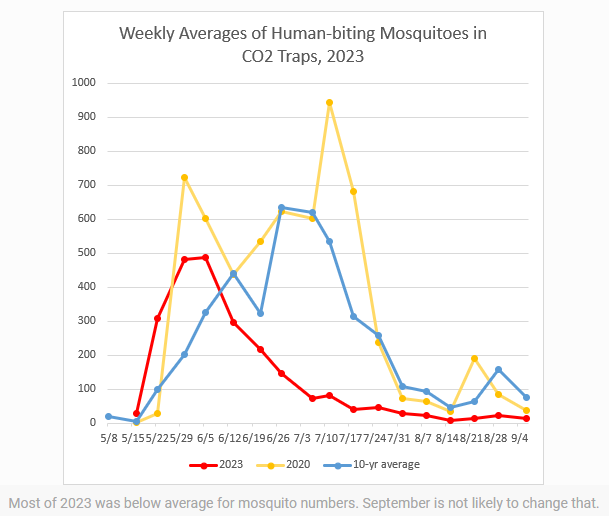Fewer mosquitos, more West Nile amid dry spring and summer
A dry spring and summer lead to fewer mosquitoes in Minnesota, but more cases of West Nile Virus as the skeeters that carry the disease do better in a drought.
According to the Metropolitan Mosquito Control District (MMCD), it’s done gathering samples for the year due to the colder temperatures and low numbers of mosquitoes collected. In the MMCD’s last collection, the trend of lower-than-average mosquitos continued.

“No rain, no mosquitos,” Alex Carlson, with the MMCD, said while still acknowledging there were still some mosquitos that hatched this year.
“We just didn’t get that precipitation we were expecting in June and July and it just caused the numbers to go down and stay down,” Carlson added.
He adds we can also be hopeful for years to come because of the drought, specifically surrounding the mosquitos that hatch from cattails in certain wetlands that will have trouble growing.
“Because of the drought, those numbers are really going to stay low for next year and probably a couple years,” Carlson said.
But, because we can’t predict the future, those couple years can also be bad as Carlson adds mosquito eggs can lay dormant for up to seven years… and that all it would take would be a rainy month or two for the eggs to hatch.
And, while the MMCD had a calmer year, one of its partners did not.
“This year, in terms of human disease, it’s kind of turning into a busy one,” Elizabeth Schiffman, an epidemiologist with the Minnesota Department of Health, said.
She oversees the unit that tracks viruses like West Nile Disease.
“The mosquitoes, unfortunately, that can cause diseases like West Nile in our state, they often do really well in kind of drought conditions,” Schiffman said. “They’re very good at finding just that little bit of water that’s out there to help kind of keep themselves going.”
Schiffman says most people who get West Nile will never know as they do not show symptoms. For those that did this year, case severity ranged. And, with mild, and not freezing, weather ahead, we’re not out of the woods.
“For these next few weeks, here in September, just don’t forget, there are still a few mosquitoes out there and all it takes is one infected mosquito to make you sick,” Schiffman said.
Learn more about how the MMCD works here.